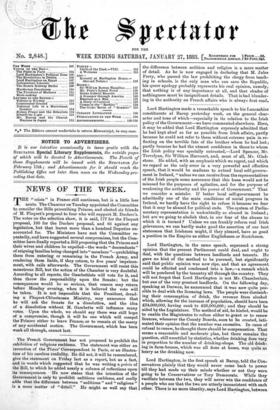Lord Hartington made a remarkable speech to his Lancashire constituents
at Bacup yesterday week, on the general char- acter and tone of which—especially in its relation to the Irish policy of the Government—we have commented elsewhere. Here, it may be added that Lord Hartington expressly admitted that he had kept aloof as far as possible from Irish affairs, partly because he could not refer to them without extreme pain in re- flecting on the terrible fate of the brother whom he had lost ; partly because he had the utmost confidence in those to whom. the Irish policy was specially entrusted,—Lord Spencer, Mr. Trevelyan, Sir William Harcourt, and, most of all, Mr. Glad- stone. He added, with an emphasis which we regret, and which we regard as the only error in a .very powerful and effective speech, that it would be madness to extend local self-govern- ment in Ireland, "unless we can receive from the representatives of the Irish people some assurance that this boon would not be misused for the purposes of agitation, and for the purpose of weakening the authority and the power of Government." That we consider a mistake. If better local self-government be admittedly one of the main conditions of social progress in. Ireland, we hardly have the right to refuse it because we fear that it may be abused for political ends. The system of Parlia- mentary representation is undoubtedly so abused in Ireland ; but are we going to abolish that, in our fear of the abuses to which it is turned ? Unless we can frankly reform real Irish grievances, we can hardly make good the assertion of our best statesmen that Irishmen might, if they pleased, have as good a position in the Empire as either Englishmen or Scotchmen.






































